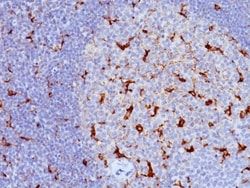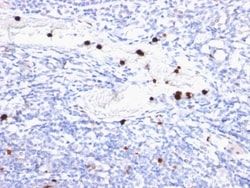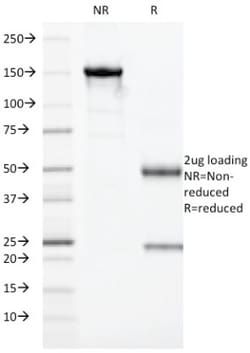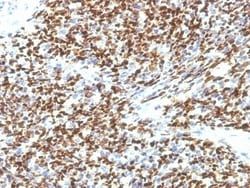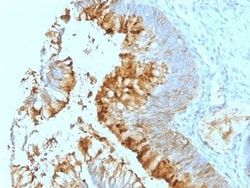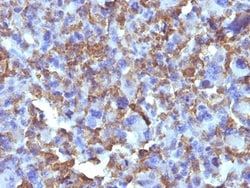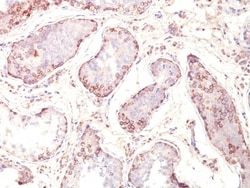Macrophage and Histiocytoma Marker Antibody (D11), Novus Biologicals™
Mouse Monoclonal Antibody
Manufacturer: Fischer Scientific
The price for this product is unavailable. Please request a quote
Antigen
Macrophage and Histiocytoma Marker
Concentration
0.2mg/mL
Applications
Immunohistochemistry (Paraffin)
Conjugate
Unconjugated
Host Species
Mouse
Target Species
Human, Mouse (Negative), Porcine (Negative), Rat (Negative)
Immunogen
Membrane preparation from human hepatocytes
Primary or Secondary
Primary
Content And Storage
Store at 4C.
Clone
D11
Dilution
Immunohistochemistry-Paraffin 0.5 - 1.0 ug/ml
Classification
Monoclonal
Form
Purified
Regulatory Status
RUO
Formulation
10mM PBS with 0.05% Sodium Azide
Isotype
IgG1 κ
Purification Method
Protein A or G purified
Test Specificity
In Western blotting, it detects an antigen of 125kDa in human liver and 135kDa in tumors of histiocytic origin. Comparative study of this MAb and a standard CD68 MAb showed that their antigens are different. Its antigen in all macrophage types studied is located on the plasma membrane and within cytoplasmic structures including lysosomes. This MAb shows a restricted reactivity to cells of the monocyte/macrophage system. It specifically reacts with blood monocytes and stains resident macrophages in a wide variety of human tissues. This MAb does not stain antigen-presenting cells, e.g., Langerhans cells. Reportedly, its reactivity is restricted to histiocytes and macrophages.
Description
- Ensure accurate, reproducible results in Immunohistochemistry (Paraffin) Macrophage and Histiocytoma Marker Monoclonal specifically detects Macrophage and Histiocytoma Marker in Human, Mouse (Negative), Porcine (Negative), Rat (Negative) samples
- It is validated for Immunohistochemistry, Immunohistochemistry-Paraffin.
